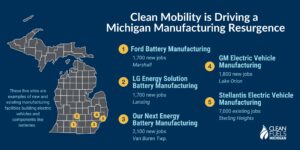The implementation of new tariffs is already sending ripples through global markets. The consequences of across-the-board tariffs are real and immediate for industries like automotive that are tied to international supply chains.
“The need to maintain a resilient domestic manufacturing capacity is particularly acute in advanced sectors like autos, shipbuilding, pharmaceuticals, transport equipment, technology products, machine tools, and basic and fabricated metals, where loss of capacity could permanently weaken U.S. competitiveness.” – The White House Fact Sheet on Pursuing Reciprocity to Rebuild the Economy and Restore National and Economic Security
The Trump administration has framed these tariffs as essential to restoring American manufacturing strength and reducing the country’s reliance on foreign-made goods.
Why Tariffs Threaten EV and Clean Mobility Growth in Michigan
We agree: domestic manufacturing is essential. The United States can and should lead in advanced manufacturing. Michigan plays a central role in that leadership as the auto industry rapidly transitions to electric vehicles, battery production, and other clean mobility technologies.
However, these tariffs introduce significant uncertainty across industries with complex international supply chains and threaten precisely the sectors identified by the Trump administration as critical to American competitiveness. Businesses developing EVs, batteries, charging infrastructure, and other advanced transportation technologies now face unpredictable costs and supply disruptions. These headwinds come at a time when Michigan is building strong momentum as a national leader in these sectors.
Michigan Manufacturing is Already Making a Comeback
The truth is, if the goal is to bolster domestic manufacturing in advanced sectors like clean mobility, Michigan already has a winning strategy in place. Over the last few years, a combination of supportive federal and state policies have helped transform Michigan into a hub for next-generation transportation technologies. The Bipartisan Infrastructure Law (BIL) and the Inflation Reduction Act (IRA) not only provided historic investments in advanced mobility and technology manufacturing, but they also came with strong made-in-America requirements. As a result, Michigan has become the top destination for businesses building EVs, batteries, components, and other clean mobility technologies.

Robust federal incentives and our rich history of automotive leadership have ensured that advancements in automotive technology, from research and development to manufacturing, will take place right here in Michigan. Michigan has benefited from billions of dollars in investment, supporting thousands of new jobs in the clean mobility sector. If the goal is to strengthen American manufacturing, we’re already on the right path. But the sudden shift introduced by these tariffs could disrupt that progress. Businesses that were beginning to scale up, hire, and build new facilities in Michigan are now facing renewed uncertainty about the future of their supply chains and the cost of doing business in the US.
Michigan Must Meet the Moment
Still, the global race for clean mobility leadership is far from over. China, in particular, poses a serious competitive threat. And not just in EV manufacturing, but in the broader automotive sector. Over the last decade, China has dramatically expanded its automotive manufacturing capacity and now dominates large portions of the EV supply chain. Chinese automakers are increasingly targeting international markets with lower-cost EV models made possible by aggressive industrial policy.
If we’re serious about maintaining Michigan’s leadership in automotive innovation, we cannot afford to rely only on blunt instruments like across-the-board tariffs that create market uncertainty. Instead, Michigan must double down on its strengths: World-class research and development, a highly skilled workforce, strong public-private partnerships, and a deep automotive legacy.
The clean mobility sector has proven its immense potential for job creation and economic growth, but success is not guaranteed. As new federal tariffs inject uncertainty into global markets, Michigan must continue to signal that it is open for business. State leaders should respond to this moment with focused, forward-looking policies that help clean mobility businesses scale, localize supply chains, and outcompete global rivals, ensuring that the future of mobility is built right here at home.

